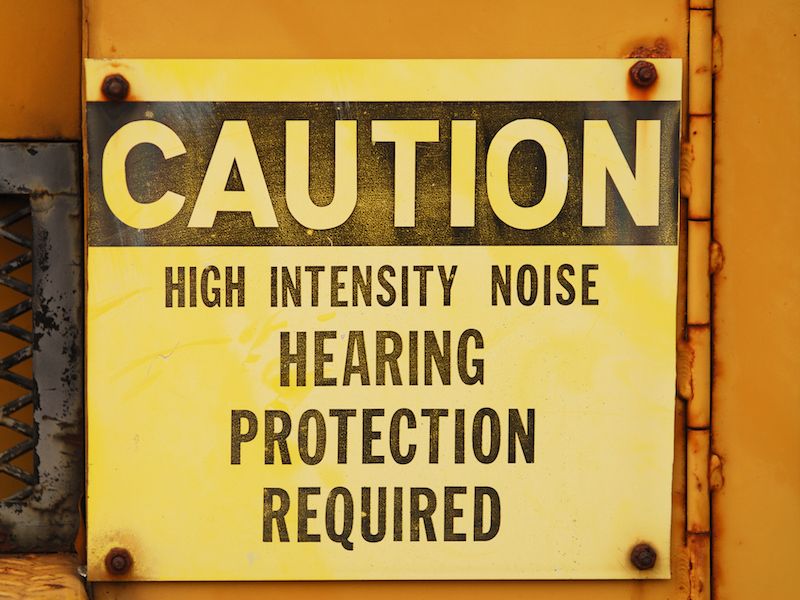
Knowing you need to protect your ears is one thing. It’s another matter to know when to safeguard your hearing. It’s more challenging than, let’s say, recognizing when you need sunblock. (Is the sun out and are you going to be outside? Then you need sunblock.) It’s not even as easy as knowing when to use eye protection (Working with hazardous chemicals? Doing some construction? You need eye protection).
It can feel like there’s a large grey area when dealing with when to wear hearing protection, and that can be detrimental. Unless we have specific knowledge that some place or activity is dangerous we tend to take the easy path which is to avoid the issue entirely.
Risk Evaluations
In general, we’re not very good at assessing risk, especially when it comes to something as intangible as damage to the ears or the probability of lasting sensorineural hearing loss. Let’s take some examples to prove the point:
- Person A attends a very loud rock concert. The concert lasts about 3 hours.
- Person B has a landscaping business. After mowing lawns all day, she goes home to quietly read a book.
- Person C works in an office.
You may believe the hearing danger is greater for person A (let’s just call her Ann). Ann leaves the show with ringing ears, and she’ll spend the majority of the next day, trying to hear herself speak. It seems reasonable to assume that Ann’s activity was quite hazardous.
The noise that person B (let’s just call her Betty), is exposed to is not as loud. Her ears don’t ring. So her hearing must be safer, right? Not really. Because Betty is mowing all day. So despite the fact that her ears never ring out with pain, the damage accrues gradually. If experienced on a regular basis, even moderately loud sounds can have a damaging affect on your ears.
Person C (let’s call her Chris) is even less evident. Lawnmowers have instructions that emphasize the hazards of continued exposure to noise. But even though Chris works in a quiet office, she has a really noisy, hour-long commute every day on the train. Additionally, she sits behind her desk and listens to music through earbuds. Is protection something she should think about?
When is it Time to Worry About Safeguarding Your Ears?
Normally, you need to turn down the volume if you have to shout to be heard. And if your surroundings are that noisy, you need to think about wearing earmuffs or earplugs.
So to put this a bit more scientifically, you need to use 85dB as your limit. Sounds above 85dB have the ability, over time, to result in injury, so in those scenarios, you need to consider using hearing protection.
Most hearing specialists advise using a special app to keep track of decibel levels so you will be cognizant of when the 85dB has been reached. These apps can inform you when the ambient noise is approaching a dangerous level, and you can take suitable steps.
A Few Examples
Even if you do download that app and take it with you, your phone may not be with you everywhere you go. So a few examples of when to safeguard your ears might help you establish a good standard. Here we go:
- Household Chores: Even mowing the lawn, as previously stated, calls for hearing protection. Cutting the grass is a good example of the type of household task that might cause damage to your hearing but that you probably don’t think about all that often.
- Listening to music with earbuds. OK, this doesn’t call for protection but does require care. Whether your music is going directly into your ears, how loud it is playing, and how long you’re listening to it are all things you need to pay attention to. Noise-canceling headphones are a smart choice to prevent needing to turn the volume way up.
- Driving & Commuting: Do you drive for Lyft or Uber? Or maybe you’re taking the subway after waiting for a while downtown. The noise of living in the city is bad enough for your hearing, not to mention the extra damage caused by cranking up your music to drown out the city noise.
- Exercise: Your morning spin class is a perfect example. Or maybe your nighttime yoga session? All of these cases may call for ear protection. Those trainers who use microphones and sound systems (and loud music) to motivate you might be good for your heart rate, but all that loudness is bad for your hearing.
- Using Power Tools: You recognize you will require hearing protection if you work all day in a factory. But how about the hobbyist building in his garage? Most hearing professionals will suggest you wear hearing protection when working with power tools, even if it’s only on a hobbyist basis.
A strong baseline might be established by these examples. If there is any doubt, however, use protection. Rather than leaving your ears exposed to future damage, in most cases, it’s better to protect your hearing. If you want to be able to hear tomorrow, protect today.